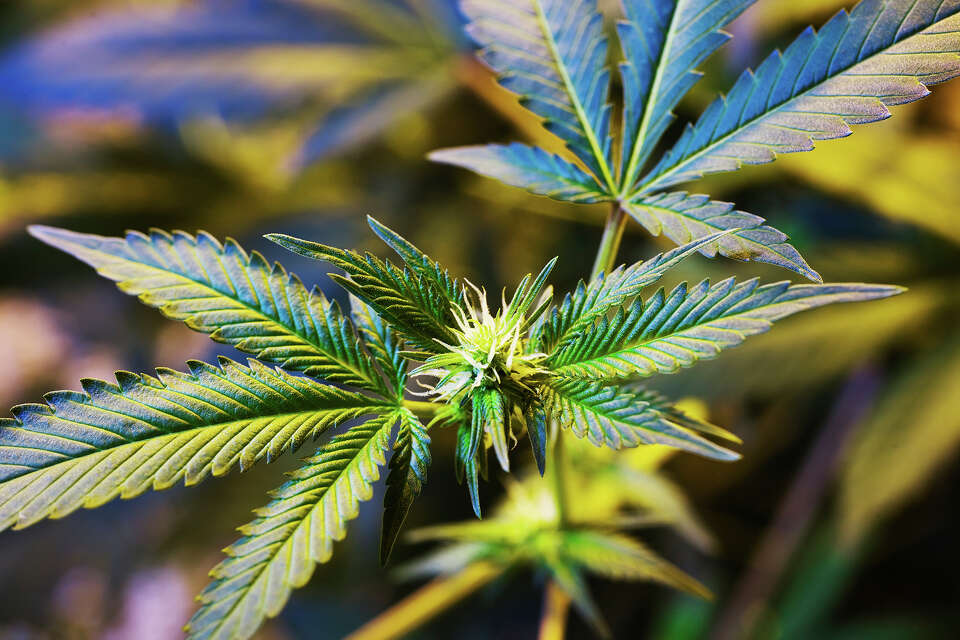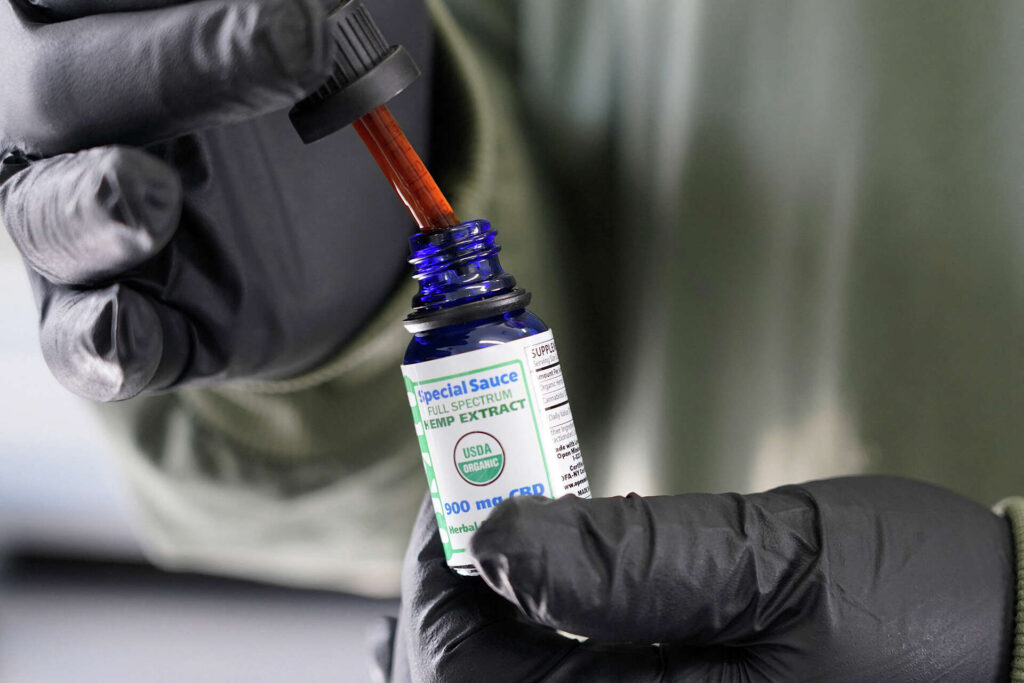Kim Howard has spent the past six years trying to keep her cannabis cosmetics company alive in California’s legal marijuana market, selling her cannabis-infused eye creams and skin serums at dispensaries across the state. But late last year, she finally gave up. She returned her state marijuana license and pulled her Green Bee Botanicals products from the state’s dispensaries.
Yet, in an ironic twist, she’s never been more optimistic about her company’s future. She thinks quitting the recreational market could be the best thing that’s ever happened to Green Bee Botanicals.
That’s because she’s joined a wave of California entrepreneurs who have pivoted to the hemp industry, turning their backs on California’s embattled marijuana market in favor of the federally legal version of cannabis called hemp. Howard said pivoting to hemp has meant lower taxes, cheaper regulations and the ability to sell in 30 states across the country instead of just in California.
“Rather than the thorny obstacles we’ve had to crawl through [in California’s marijuana industry], it’s like being in a regular market,” Howard told SFGATE. “Now we’re going to be able to have an e-commerce site online and sell to every state that allows CBD.”


With the legal marijuana market imploding, some of California’s most innovative pot companies are bypassing the state’s regulated marijuana system entirely in favor of recategorizing their products as hemp. Green Bee Botanicals transitioned its award-winning cannabis skin care line to hemp this summer, following other companies like Wyld, the top edible brand in California, which now sells THC-rich edibles through the hemp market. The San Francisco company Rose, which partners with some of the best chefs in the world on exclusive weed edibles, told SFGATE in November that demand has skyrocketed since it shifted to hemp. Even the Truffle Man, perhaps San Francisco’s most iconic marijuana figure in the past decade, has fled the marijuana market to sell his famous confections in the hemp industry (the company said on its website it sold out almost as soon as it opened its hemp business).
The exodus is sending shock waves through the industry, bleeding an already troubled marijuana market of needed businesses — and the customers who would shop there. It’s also befuddling regulators, who are unsure of what to do as intoxicating hemp products are sold outside the protection of state regulations.
What actually is hemp?
California’s shift toward hemp was set in motion six years ago, when an oversight in Congress accidentally set off a boom in this long-overlooked side of cannabis. For decades, federal law didn’t differentiate hemp from marijuana; they were grouped together under the word “marihuana” on the list of Schedule I substances, the most restrictive class of illegal drugs in the country.
In 2018, Congress decided to legalize hemp by removing it from the federal definition of marijuana. Separating the two pot categories is very difficult, however, as they are the same exact species: cannabis sativa l. Scientists still actively debate how to differentiate hemp from marijuana, but nearly everyone agrees that Congress wrote an incredibly sloppy definition. Federal lawmakers decided that any cannabis plant that contains less than 0.3% delta-9-THC by weight was hemp, and everything else was marijuana.

Here’s the problem: Hundreds of active chemicals are in pot, and delta-9-THC is just one. Many of these other cannabis compounds can get you high. Congress apparently didn’t realize this, so lawmakers inadvertently legalized hundreds of different cannabis drugs like delta-8-THC, a slightly different version of the more familiar delta-9-THC.
This has allowed a proliferation of hemp drugs that look nearly identical to the marijuana sold at state-regulated dispensaries. For example, Cookies, the most famous San Francisco pot brand, sells “THCa hemp flower” online, which the company says is “not a huge amount” different from regular THC but is “convenient, easy, and safe thanks to its legal standing.” It looks nearly identical to the high-THC marijuana flower pot sold at Cookies’ marijuana dispensaries. It didn’t take long for the cannabis industry to find even more loopholes in the law, which have allowed them to sell delta-9-THC openly too: Rose and Wyld sell hemp edibles that contain 10 milligrams of delta-9-THC, just as strong as THC edibles found at a legal dispensary.
These loopholes are a nightmare for state lawmakers and public health advocates, who worry that intoxicating drugs are being sold online and at gas stations in easy reach of children (Congress legalized hemp drugs like delta-8-THC without establishing a federal minimum age for purchasing them). These hemp products also face almost none of the product safety regulations that legal marijuana must pass through.
Yet officials have been unable to shut down the growing hemp industry. Instead, it has become a multibillion-dollar market that’s flashing like a lighthouse for troubled marijuana operators, who are looking for a reprieve from the rough waters of California’s regulated marijuana industry.
‘Like night and day’
Bridget May, Howard’s business partner at Green Bee Botanicals, said the difference between running a hemp business and running a marijuana business is “like night and day” when it comes to dealing with regulations. It can take years to get a marijuana license and millions of dollars in fees, but May said when it came to running a hemp business, “There’s pretty much nothing to deal with.”

Teddy Cabugos, the president of Sunstone Winery, shared a similar story after his company pivoted its cannabis-infused drink from California’s recreational market to the hemp industry.
“It’s two different worlds of permitting,” Cabugos said. “One is going to cost you a s—t ton of money and a lot of time, and the other is going to cost you no money and almost no time.”
There are practical considerations when companies make the transition. They must reformulate their products with hemp sources instead of marijuana. For farmers, that means just growing different plants, but for manufacturers like Sunstone or Green Bee Botanicals, that process can take many different routes, especially regarding how much THC is in their final products. Sunstone’s new hemp drinks contain 5 milligrams of delta-9-THC, the same dose it had in its marijuana products. Kalon Baird, the co-founder of Splash Nano which worked with Sunstone to formulate the product, said the drink does not violate federal law because it still contains less than 0.3% of delta-9-THC based on the weight of the product. May said Green Bee Botanicals has updated its recipes to contain only minimal amounts of THC — below 1 milligram per serving — a change from its marijuana cosmetics, which contained larger amounts of the compound.
Once the transition is made, hemp offers many things companies that operate in the legal marijuana industry can only dream of. Hemp companies can sell their products online directly to customers and ship products in the mail; that is illegal for marijuana products, due to their continuing status as a federally controlled substance. Hemp companies can also sell products across the country, instead of being limited to selling only through the over 1,200 legal dispensaries within the state of California.
To make hemp even more enticing, companies no longer will be required to charge their customers California’s cannabis taxes, which Howard estimated will make Green Bee Botanicals’ products cost 30% less.
These benefits have made the hemp industry irresistible to marijuana entrepreneurs and farmers, according to Andrew DeAngelo, a cannabis consultant with two decades of experience in California’s cannabis industry.
“If I’m a legacy [marijuana] grower … I’m going to spend half a million getting a [marijuana] license. Well, I can save hundreds of thousands of dollars, build the same goddamn thing and grow hemp. So of course people are going to do that,” DeAngelo said.
The growing battle over hemp
With the hemp industry surging, there’s now a growing war between hemp and marijuana, with dozens of states passing laws to crack down on hemp sales. California lawmakers are jumping into the fray, proposing a law that has erupted into controversy.
Opposition to hemp has united strange bedfellows, bringing together the marijuana industry with public health advocates who have spent years attacking pot. Licensed marijuana companies are angry the hemp industry can sell nearly identical products without paying steep licensing and other regulatory costs. Public health officials are concerned underage youth have access to hemp products sold online without age verification.

California lawmakers tried to regulate the hemp market with a 2021 law that banned inhalable hemp products but allowed foods to be infused with hemp compounds. The hemp industry has only grown since then, so the state is now considering a law that would make it illegal to buy any hemp product in California outside a pot dispensary if that product contains anything more than 1 milligram of THC. If approved, the proposal could shut down sales at some of these new hemp companies, just as they pivot away from marijuana.
May, of Green Bee Botanicals, said she and Howard believe their products will still be compliant even if the law passes, because they contain only small amounts of THC. Either way, pivoting to hemp still seems to her like the only way for her company to survive, thanks to what she calls the “broken system” of California’s marijuana regulations.
“It just seemed like California could have done so much better to set this industry up for success,” May said. “It’s sad when you know all of our friends are out of business, except the ones who switched to hemp.”
H/T: www.sfgate.com



